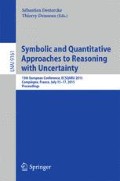Abstract
An important problem in knowledge-based systems is inconsistency handling. This problem has recently been attracting a lot of attention in AI community. In this paper, we tackle the problem of evaluating the amount of conflicts in knowledge bases, and provide a new fine grained inconsistency measure, denoted MCSC, based on maximal consistent sets. In particular, it is suitable in systems where inconsistency results from multiple consistent sources. We show that our measure satisfies several rational postulates proposed in the literature. Moreover, we provide an encoding in integer linear programming for computing MCSC.
Access this chapter
Tax calculation will be finalised at checkout
Purchases are for personal use only
Notes
- 1.
In the original paper, this property is called enhanced additivity.
References
Hunter, A., Konieczny, S.: On the measure of conflicts: Shapley inconsistency values. Artif. Intell. 174(14), 1007–1026 (2010)
Grant, J.: Classifications for inconsistent theories. Notre Dame J. Formal Logic 19(3), 435–444 (1978)
Knight, K.: Measuring inconsistency. J. Philos. Logic 31(1), 77–98 (2002)
Konieczny, S., Lang, J., Marquis, P.: Quantifying information and contradiction in propositional logic through test actions. In: IJCAI, pp. 106–111 (2003)
Qi, G., Liu, W., Bell, D.A.: Measuring conflict and agreement between two prioritized belief bases. In: IJCAI, pp. 552–557 (2005)
Mu, K., Liu, W., Jin, Z.: A general framework for measuring inconsistency through minimal inconsistent sets. Knowl. Inf. Syst. 27(1), 85–114 (2011)
Grant, J., Hunter, A.: Distance-based measures of inconsistency. In: van der Gaag, L.C. (ed.) ECSQARU 2013. LNCS, vol. 7958, pp. 230–241. Springer, Heidelberg (2013)
Hunter, A., Parsons, S., Wooldridge, M.: Measuring inconsistency in multi-agent systems. Kunstliche Intelligenz 28, 169–178 (2014)
Chen, Q., Zhang, C., Zhang, S.: A verification model for electronic transaction protocols. In: Yu, J.X., Lin, X., Lu, H., Zhang, Y. (eds.) APWeb 2004. LNCS, vol. 3007, pp. 824–833. Springer, Heidelberg (2004)
Martinez, A.B.B., Arias, J.J.P., Vilas, A.F.: On measuring levels of inconsistency in multi-perspective requirements specifications. In: PRISE 2004, pp. 21–30 (2004)
Hunter, A.: How to act on inconsistent news: ignore, resolve, or reject. Data Knowl. Eng. 57(3), 221–239 (2006)
Grant, J., Hunter, A.: Measuring inconsistency in knowledgebases. J. Intell. Inf. Syst. 27(2), 159–184 (2006)
Martinez, M.V., Pugliese, A., Simari, G.I., Subrahmanian, V.S., Prade, H.: How dirty is your relational database? an axiomatic approach. In: Mellouli, K. (ed.) ECSQARU 2007. LNCS (LNAI), vol. 4724, pp. 103–114. Springer, Heidelberg (2007)
Zhou, L., Huang, H., Qi, G., Ma, Y., Huang, Z., Qu, Y.: Measuring inconsistency in dl-lite ontologies. In: Web Intelligence, pp. 349–356 (2009)
McAreavey, K., Liu, W., Miller, P., Mu, K.: Measuring inconsistency in a network intrusion detection rule set based on snort. Int. J. Semant. Comput. 5(3), 281–322 (2011)
Besnard, P.: Revisiting postulates for inconsistency measures. In: Fermé, E., Leite, J. (eds.) JELIA 2014. LNCS, vol. 8761, pp. 383–396. Springer, Heidelberg (2014)
Priest, G.: Minimally inconsistent LP. Stud. Logica. 50, 321–331 (1991)
Jabbour, S., Ma, Y., Raddaoui, B.: Inconsistency measurement thanks to mus decomposition. In: AAMAS, pp. 877–884 (2014)
Thimm, M.: Inconsistency measures for probabilistic logics. Artif. Intell. 197, 1–24 (2013)
Author information
Authors and Affiliations
Corresponding author
Editor information
Editors and Affiliations
Rights and permissions
Copyright information
© 2015 Springer International Publishing Switzerland
About this paper
Cite this paper
Ammoura, M., Raddaoui, B., Salhi, Y., Oukacha, B. (2015). On Measuring Inconsistency Using Maximal Consistent Sets. In: Destercke, S., Denoeux, T. (eds) Symbolic and Quantitative Approaches to Reasoning with Uncertainty. ECSQARU 2015. Lecture Notes in Computer Science(), vol 9161. Springer, Cham. https://doi.org/10.1007/978-3-319-20807-7_24
Download citation
DOI: https://doi.org/10.1007/978-3-319-20807-7_24
Published:
Publisher Name: Springer, Cham
Print ISBN: 978-3-319-20806-0
Online ISBN: 978-3-319-20807-7
eBook Packages: Computer ScienceComputer Science (R0)

